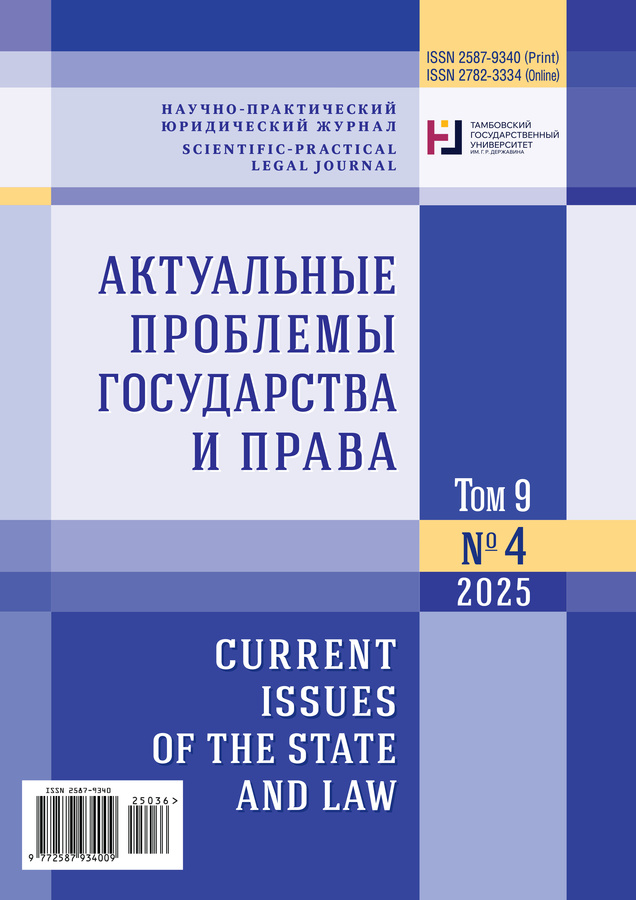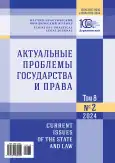Принципы права в естественно-правовом правопонимании (концепция А.В. Коновалова)
- Авторы: ИЛЮХИНА В.А.1,2
-
Учреждения:
- ФГКОУ ВО «Академия права и управления Федеральной службы исполнения наказаний»
- Нижегородский институт управления – филиал ФГБОУ ВО «Российская академия народного хозяйства и государственной службы при Президенте Российской Федерации»
- Выпуск: Том 8, № 2 (2024)
- Страницы: 197-205
- Раздел: Общая теория и история права и государства
- URL: https://journal-vniispk.ru/2587-9340/article/view/299454
- ID: 299454
Цитировать
Аннотация
Посвящено анализу концепции принципов права в естественно-правовом правопонимании в интерпретации А.В. Коновалова. Цель работы заключается в выявлении особенностей естественно-правовой концепции принципов права А.В. Коновалова и определении ее значения в теории принципов права. Сделан акцент на том, что принципы права исследуются учеными не только под разными ракурсами, но и исходя из различных типов правопонимания. Основное внимание принципам права уделяется представителями позитивистского правопонимания, в меньшей степени – либертарного и интегративного. До недавнего времени не было комплексных исследований принципов права исходя из естественно-правового правопонимания. Обосновано, что рассмотрение концепции Р. Дворкина как варианта естественно-правовой теории является дискуссионным. Доказано, что в настоящее время единственной концепцией принципов права в контексте естественно-правовой теории является концепция А.В. Коновалова, которую сам ее автор определяет как объективный идеализм и юснатуразизм. Критически проанализирована концепция принципов права А.В Коновалова, включая такие ее элементы, как представления о принципах и протопринципах права, их природе, сущности, системе, социальной значимости. Сделан вывод, что исследуемая концепция не направлена на совершенствование принципов позитивного права, а имеет, в основном, морально-этическое значение. Естественно-правовая концепция принципов права А.В. Коновалова ориентирует законодателя, правоприменителя и научное сообщество на понимание исходных идей и ценностей, которые лежат (или должны лежать) в основе социального устройства в целом и правового регулирования в частности.
Об авторах
Вера Алексановна ИЛЮХИНА
ФГКОУ ВО «Академия права и управления Федеральной службы исполнения наказаний»; Нижегородский институт управления – филиал ФГБОУ ВО «Российская академия народного хозяйства и государственной службы при Президенте Российской Федерации»
Автор, ответственный за переписку.
Email: eva3011@bk.ru
ORCID iD: 0000-0001-7049-4593
ResearcherId: AAR-5203-2021
кандидат юридических наук, доцент, доцент кафедры теории государства и права, международного и европейского права; старший научный сотрудник Научного центра
Россия, Российская Федерация, 390000, г. Рязань, ул. Сенная, 1; Российская Федерация, 603950, г. Нижний Новгород, просп. Гагарина, 46Список литературы
- Александров Н.Г. Социалистические принципы советского права // Советское государство и право. 1957. № 6. С. 16-29.
- Hart H.L.A. The Concept of Law. N. Y.: Oxford University Press, 1961. 258 р.
- Лукашева Е.А. Принципы социалистического права // Советское государство и право. 1970. № 6. С. 21-29.
- Raz J. Legal principles and the limits of law // The Yale Law Journal. 1972. № 81. Р. 823-854.
- Кузнецова О.А. Нормы-принципы российского гражданского права. М.: Статут, 2006. 269 с. https://elibrary.ru/tdaatd
- Демичев А.А. Позитивистская классификация принципов современного российского права // Государство и право. 2014. № 5. С. 5-13. https://elibrary.ru/sgnrrx
- Карташов В.Н. Принципы права: понятие, структуры, функции // Юридическая техника. 2020. № 14. С. 158-166. https://elibrary.ru/tpmatn
- Нерсесянц В.С. Право – математика свободы. Опыт прошлого и перспективы. М.: Юристь, 1996. 160 с.
- Нерсесянц В.С. Право и закон: Из истории правовых учений. М.: Наука, 1983. 366 с.
- Сидоркин А.С. Принципы права: понятие и реализация в российском законодательстве и судебной практике: автореф. дис. … канд. юрид. наук. М., 2010. 25 с. https://elibrary.ru/zodnxv
- Милкин-Скопец М.А. Принцип разумности в либертарно-правовом дискурсе. Историко-правовое исследование: автореф. дис. ... канд. юрид. наук. М., 2010. 24 с. https://elibrary.ru/qgxbrl
- Бержель Ж.-Л. Общая теория права / под общ. ред. В.И. Даниленко. М.: Изд. дом NOTA BENE, 2000. 576 с.
- Daci J. Legal Principles, Legal Values and Legal Norms: are they the same or different? // Academicus International Scientific Journal. 2010. № 2. Р. 109-115.
- Ershov V.V. The essence of the principles of law // Journal of Siberian Federal University. Humanities & Social Sciences. 2018. № 11 (12). Р. 2089-2103. https://doi.org/10.17516/1997-1370-0375, https://elibrary.ru/yrqkot
- Мазуренко С.В. Природа и классификация принципов российского трудового права: дис. … канд. юрид. наук. М., 2020. 186 с. https://elibrary.ru/btmytx
- Dworkin R. The model of rules // University of Chicago Law Review. 1967. Vol. 35. P. 14-46.
- Dworkin R. A Matter of Principle. Cambridge: Harvard University Press, 425 p. https://doi.org/10.2307/j.ctv1pncpxk
- Dworkin R. Law’s Empire. Cambridge: Harvard University Press, 1986. 470 p.
- Дворкин Р. О правах всерьез / пер. с англ. М.Д. Лахути, Л.Б. Макеевой. М.: РОССПЭН, 2004. 592 с. https://elibrary.ru/qvxkzt
- Коваль С.В. Разграничение принципов и правовых норм в философии права Р. Дворкина // Вестник Московского университета. Серия 7. Философия. 2020. № 2. С. 63-71. https://elibrary.ru/lyhqxo
- Mackie J. The third theory philosophy // Public Affairs. 1977. Vol. 7. № 1. P. 3-16.
- Касаткин С.Н. Концепция «раннего» Р. Дворкина как «третья теория права» // Вестник Воронежского государственного университета. Серия: Право. 2019. № 2 (37). С. 94-107. https://elibrary.ru/ftixid
- Коваль С.В. Концепция философии права Рональда Дворкина как альтернатива позитивизму и теории естественного права: дис. … канд. филос. наук. М., 2022. 310 с. https://elibrary.ru/igdhmq
- Коновалов А.В. Принципы гражданского права. СПб.: Право, 2019. 960 с.
- Коновалов А.В. Принципы права. М.: Норма, 2023. 792 с.
- Коновалов А.В. Принципы гражданского права: методологические и практические аспекты исследования: дис. ... д-ра юрид. наук. М., 2019. 1161 с. https://elibrary.ru/vfbvpc
Дополнительные файлы









